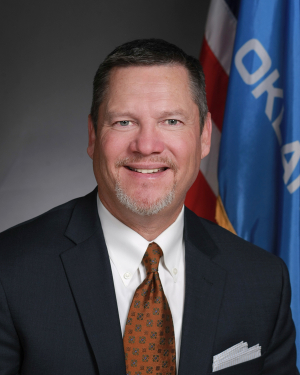This is the time of the legislative session when my colleagues and I are hard at work trying to reconcile a state budget. The Legislature has one constitutional duty each session, and that is to pass a balanced budget for the fiscal year. The budget-writing process takes all four months of session, but we’re now focused on trying to balance Senate budget requests with funding requests from the House and the governor. Although all three sides don’t always see eye to eye on every spending proposal, we try to work that out in negotiations so all sides accept the final budget. The Senate continues to push for a transparent budget process from beginning to end.
I was grateful to be recognized last week by the Oklahoma Arts Council for my role in appropriating $10 million in American Rescue Plan funds to aid arts and culture organizations across the state. After months of vetting hundreds of requests for ARPA funds, the Joint Committee on Pandemic Relief Funding, which I served on, previously decided to appropriate funds to the Oklahoma Arts Council to allocate to various nonprofit organizations. Although the $10 million in pandemic relief funds may not seem like a lot compared to the nearly $1.9 billion in federal funds the Legislature expended, these grant funds will go a long way toward helping arts nonprofits recover from the pandemic. The Senate continues to keep tabs on ARPA appropriations and the status of the projects we’ve funded through the OMES/ARPA Oversight Subcommittee, which I lead.
Speaking of ARPA funding, the Senate Finance Committee recently passed one of my bills that aims to incentivize internet service providers to build out the state’s broadband network to increase access to high-speed internet across Oklahoma. Through the ARPA process, lawmakers appropriated $367 million in federal pandemic relief funds to improve internet access, especially in rural areas. Those funds will be matched with millions more from the federal government earmarked for broadband infrastructure. Our goal is to use that money to ensure 95% of Oklahomans have access to high-speed internet by 2027.
Internet service providers pay ad valorem taxes on fiber optic cables in the ground that connect residents to internet service. But the current tax structure is complex and can vary based on the size of the broadband project and how many counties will see infrastructure upgrades. House Bill 3961 would create a uniform tax structure for these providers to encourage them to get to work expanding the state’s existing broadband network. Oklahoma is well on its way to improving internet access, and this bill is a step in the right direction toward making that happen.
I always welcome my constituents to the Capitol. I truly enjoy showing them around the Senate, telling them how a bill becomes a law, talking about key legislative issues and discussing how we write a state budget. In recent weeks, I welcomed various leadership groups, including Leadership Guthrie and Leadership Perry, to the Capitol. I also talked to Guthrie students enrolled in an AP government class. When visitors from my district come to the Capitol, they typically watch Senate proceedings from the chamber’s gallery. That gives me a chance to recognize them from the Senate floor, which gets mentioned in the Senate journal. That means these visits become part of the permanent record and the Senate’s historical documents.
As always, it’s an honor and a privilege to serve the people of Senate District 20.
The Oklahoma Legislature provides a livestream of legislative activity. Senate proceedings can be viewed online at oksenate.gov and House proceedings can be viewed at okhouse.gov.
Please feel free to contact my Capitol office with any questions or concerns you may have about legislation or other issues impacting our state at 405.521.5628 or at Chuck.Hall@oksenate.gov.




Be the first to comment on "Senator Hall: I always welcome my constituents to the Capitol"